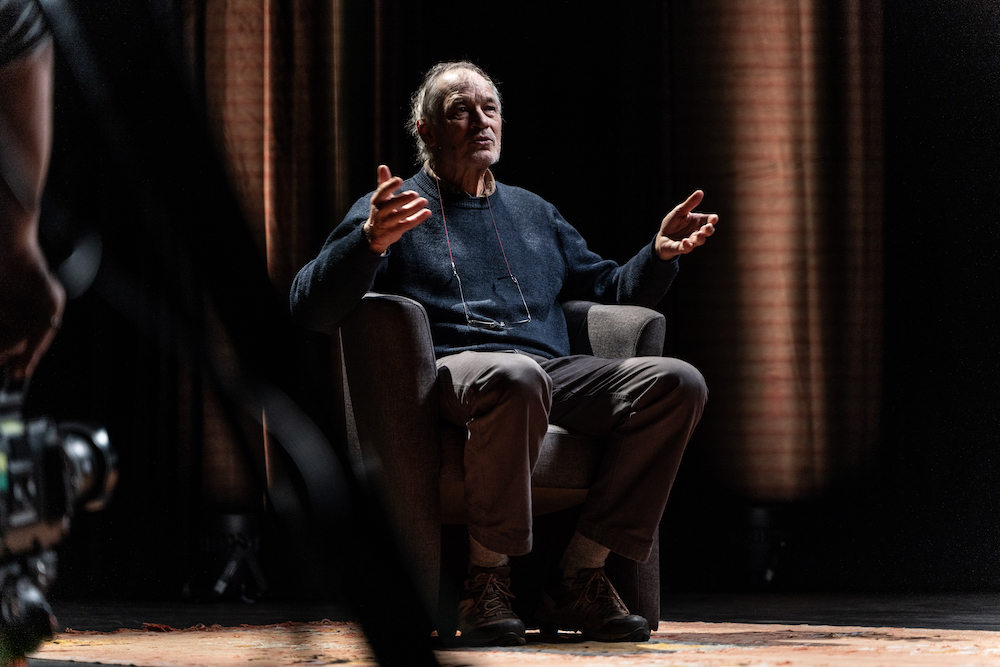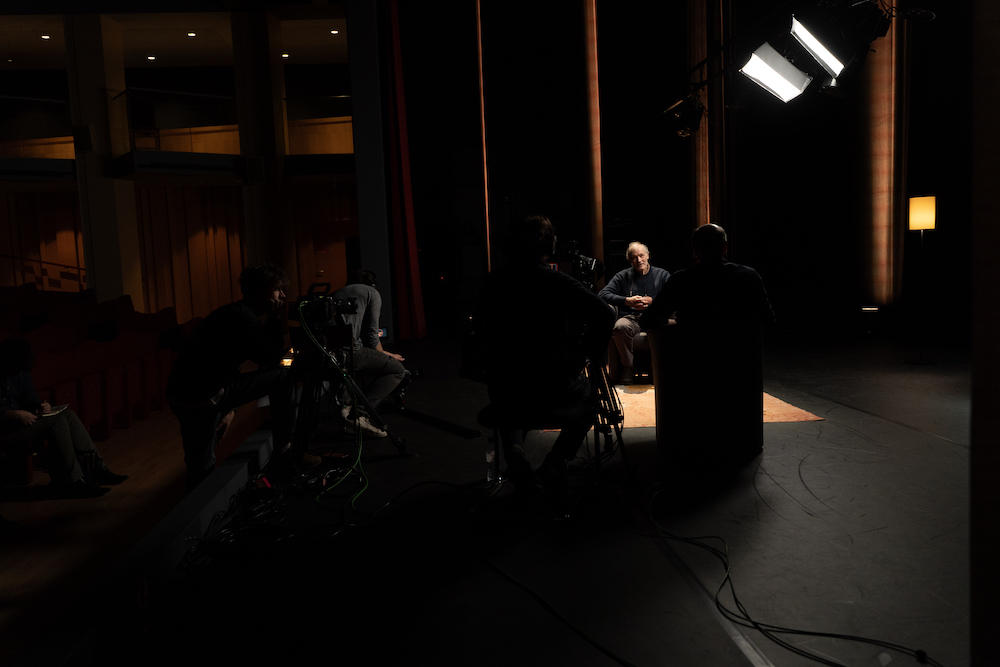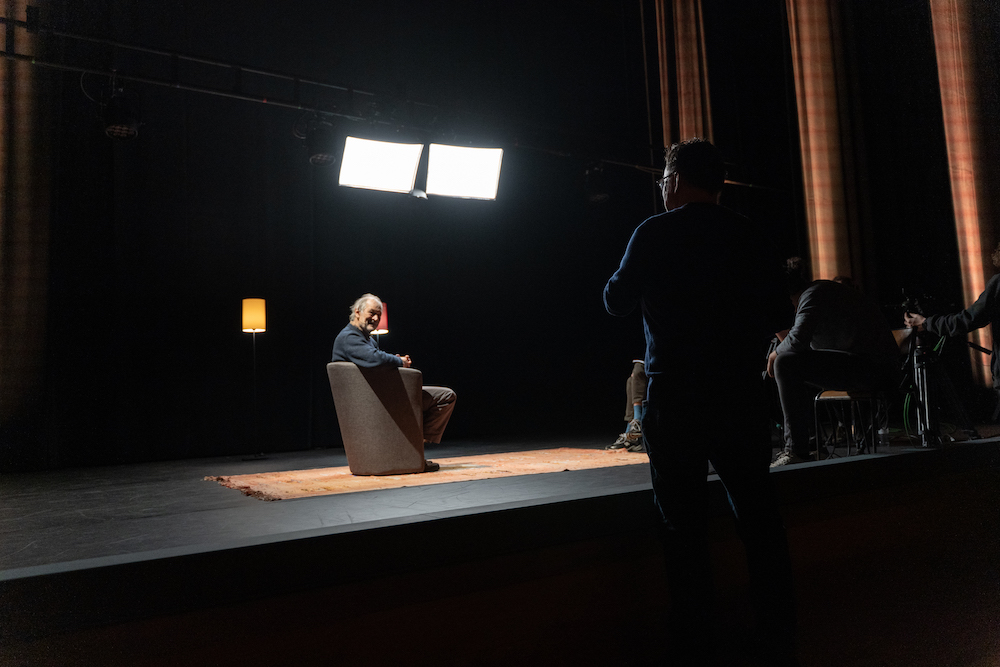David Le Breton, Anthropologist and Sociologist (France) who took part in the conference 01: How Can Narratives Change the Lives of Beings?
David Le Breton is a professor of sociology at the University of Strasbourg, senior member of the Institut universitaire de France, member of the Institute for Advanced Studies of the University of Strasbourg (USIAS). He is the author of a considerable work, with among others: “Walking life. A quiet art of happiness”, “Laughing. An anthropology of the laughing”, and “The taste of the world”.
— an interview conducted by Vassili Silovic, author and director of documentary films, and recorded at Les Champs Libres (Rennes) as part of the series “What stories for our time?”.

David Le Breton
« There are countless worlds within the same world. Sometimes these worlds are irreconcilable, coexisting more or less peacefully »
An infinitely plural world
David Le Breton – Obviously I’m not in a position to lecture on how to write a script or film because each creative person develops their own method.
That said, I think we live in an infinitely plural world. That’s why I define myself as an anthropologist of contemporary worlds, because there are countless worlds within the same world. Sometimes these worlds are irreconcilable, coexisting more or less peacefully, not without violence, not without intimidation, sometimes with more consent and mutual recognition, but it’s a world which has become very complex.
« In the 90s, everything that used to connect people disappears. It’s a period, when the “king persona”, the “tyrant persona” emerges »
The emergence of individualism
David Le Breton – I think it all began, let’s say today’s world, began in the 1990s, for our Western societies. The 90s roughly mark the disparition of class culture, regional and political cultures.
In France, it’s the end of the Communist Party, the beginning of the end of the Socialist Party. So, forms of alternatives and narratives for the future collapse.
It’s also the beginning of the end for religious identities and like.
However, everything that used to connect people disappears. It’s a period, when the “king persona”, the “tyrant persona” emerges. It’s the emergence of individualism in our Western societies.
When I say individualism, I am using a sociological concept. I don’t mean the emergence of selfishness, that would be nonsense, obviously. Individualism is also the emergence of freedom and a lot of leeway, which we had less of in the 70s, 80s, and so on. At the same time, it’s a society where people live isolated from one another.
We’re less and less together, living parallel next to each other in a form of self-withdrawal. There’s a dislocation of past forms of solidarity, of alliances, communities, etc.
« This individualisation of the social bond, requires that, to exist, we create our own story »
The decline of the grand narratives of collective identities
David Le Breton – It’s the emergence of a world where everyone claims to be right and therefore to dominate others in a way, not just to reason with them, but to block, confine, and impose one’s point of view. With the decline of the grand narratives of these collective identities which our world has been founded on for countless generations.
This fragmentation of the social bond that we’re experiencing today, this individualisation of the social bond, requires that, to exist, we create our story: “I was born at this time, I did this, I did that, etc.” There’s a proliferation of minor stories nowadays which structure our identity, which Paul Ricœur aptly calls “narrative identity”. We use narrative identities because there’s no option.

« Today, we would not make the same films »
Communication or conversation
David Le Breton – The world of communication has taken over the world of bringing together, of conversing, and memory also. Because we will remember only the trivial details. So we no longer know where we stand.
Of course for future generations, it’s obvious they’ll be communicating remotely… I’m somewhere between two worlds, I know what we have lost. And it’s not nostalgia.
I recall the profundity of our encounters the intensity of our relationships, which, as a movie lover, I find when I watch films from the great classics, I realise we’ll never exchange in the same way again. The voices aren’t the same, nor the way we touch or look at each other, the situations…
« There is a vast feeling of loneliness, abandonment, isolation that today’s technologies provoke »
Loneliness at the heart of our societies
David Le Breton – If we take two or three films from the 40s, 50s, and two or three films from recent years, we’d see a striking anthropological shift. Suffering has never been so prevalent in our contemporary societies, be it the risk behaviour of the young, which proliferates today, or the hardship among the elderly, which is also absolutely terrifying.
And the number of people in distress, who are unhappy in their lives, ill at ease with themselves, regardless of age. Ultimately, this world’s legacy isn’t the best. I’m not saying that the start of the 20th century was great either. But this is what today’s technologies provoke. Namely, a vast feeling of loneliness, abandonment, isolation… Solitude can also be a choice. But particularly isolation.
« The movement of the body allows changing one’s familiar horizon, exposing oneself to the new, to the unknown »
Walking as resistance & opening
David Le Breton – That said, there are alternatives. I’ve often written on walking. I believe it is, today, a form of resistance to all that, a resistance to mobile phones, to urgency, to speed, expected availability, we’re permanently on call.
Those who walk, are men or women who set out open to opportunities. I like to refer to them as “Artists of opportunity”. Walking is “the body in motion”. It’s about changing one’s familiar horizon, exposing oneself to the new, to the unknown. The movement of the body implies movement in the mind.
When we’re at home or when a group of scriptwriters work together, we tend to ruminate, to go round in circles. Because we’re in the same room, the landmarks around us are familiar.

« By going out of our usual landmarks, we are necessarily putting ideas in motion, each within the group »
New horizons for healing
David Le Breton – It’s clear that when we stand up we’re no longer part of seated humanity, it’s humanity standing, moving forward, getting out of the car or leaving a familiar environment. As a result, ideas are set in motion. Then suddenly, we open up to the wide world, to the great outdoors. And that’s when the ideas come.
We’re no longer focused on the idea of “how do we get out of this scenario, out of this situation?” We have no idea. We struggle for an hour trying to find something of interest. When we go out, we stop asking these questions, because we’re standing, we see the sun or the threatening rain etc. We take our first steps, we see the sea. Our environment has radically changed. At that point, without thinking, we find solutions.
Walking always presents a healing aspect. It’s a way of provoking intuition, new ways of thinking.
« When we watch a John Ford film or the like, we’re struck by their absolute humanism »
The history of cinema and literature as remedies
David Le Breton – We have to rediscover the horizon. So what are “forms of healing” that we might find in movies, literature, or elsewhere?
There’s the whole history of cinema. There’s the whole history of literature.
When we watch a John Ford film or the like, we’re struck by their absolute humanism. We learn from them. Even a film like “The Searchers”, which, as a movie-lover is, the greatest film. It’s an extraordinary lesson on revival, love, friendship, all those things. We can draw on that.
Fiction to take a step back from the world that is ours
David Le Breton – But it’s difficult because we have to avoid complacency.
When people tell me I’m a pessimist and that I should tell happier stories, it doesn’t make sense. It’s like practicing the Coué Method saying “All is bad, but let’s be happy anyway”.
“I believe that today’s fiction, even if it aims to remedy, it should address today’s sufferings, today’s existential distress, which allow the audience to analyse, to understand and appropriate them in order to maybe change something in their own lives. Otherwise, what’s the point of fiction if it doesn’t help us live, if it doesn’t help us gain perspective on the world around us?”
– David Le Breton
« If we’re tackling a sensitive subject, I don’t think we should be afraid of pointing out the ambivalences of today’s world »
Ambivalence and Unformatted
David Le Breton – There’s an astonishing standardisation of scripts today, especially with American blockbusters, which have completely dominated the market.
So, if we want to reflect on the world, with all its ambivalence, complexities, etc., we should turn towards filmmakers who even with much smaller budgets make films… Or Clint Eastwood films with bigger budgets whom I consider a filmmaker who deals with ambivalence, complexity, ambiguity, etc.
© Photos Brigitte Bouillot
Podcast: Play in new window | Download
